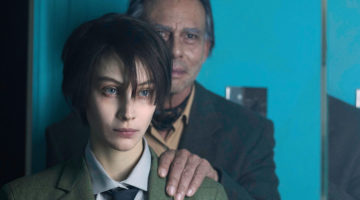Review: Ginger and Rosa
Synopsis:
In 1962 London, two teenage best friends deal rising temperatures internally, domestically, and globally. The Cold War looms, presenting the possibility of total annihilation, but Ginger and Rosa must first deal with their fracturing families and growing sexual urges.
Who’s in It?
Elle Fanning is incandescent as Ginger, while Alice Englert places her dark-haired best friend. Christina Hendricks, Timothy Spall, Oliver Platt, and Annette Bening are all great in support, and Alessandro Nivola is most conflicting.
Review:
Born on the same day, Ginger and Rosa are inseparable, curious youth. They pass time skipping class, smoking cigarettes, trading kisses, and reading about fashion and boys. Innocent wonderings and youthful indiscretion are typical traits; while they know of the past war in theory and discussion, living through the aftermath, the Cold War is most troubling.
That the world could end at any minute drives Ginger. She is thoughtful and tempered, not a child though not yet an adult. Her concern alternates between total fear and hardened purpose. Ginger wonders if each day is her last, acting to prevent an apocalyptic future, while Rosa is impulsive and careless, as if she were the one worried about imminent doom and acting out. The red-headed half of the pair is more the adult, theorizing with family friends, and most notably, inspired by her literary pacifist father.
Roland treats his daughter as an equal, which is better than how he talks to his wife. When the marriage bond frays, Ginger opts for the mental stimulation of her father over maternal comforts. She, like Rosa, is drawn to smart, activist men, but political ideologies soon confront blossoming sexuality, and the tenets for one may not work for the other. Desiring freedom from government isn’t the same as wanting freedom from family.
Written and directed by Sally Potter, tension ever so slowly and quietly builds, with several scenes at dinner filled with cutting, honest dialogue, powered by fantastic performances, especially that of young Fanning.
It is as if you were placed gently in a pot of water that you don’t realize has been building to a boil until it is too late. The eruption does come, hinted at in spits and spats and then finally at full bore. It is a fast finale, given just the right amount of time to close things at the end, but leaving the audience to deal with the fallout.
Should I See It?
Yes, but tis heavy fare.
Memorable Quote:
One of the many pointed remarks, Roland jabs Ginger for thinking about God, as that is what followers do, and not someone with free will. She responds. “I autonomously decided to go to Church.”
[star v=4]




